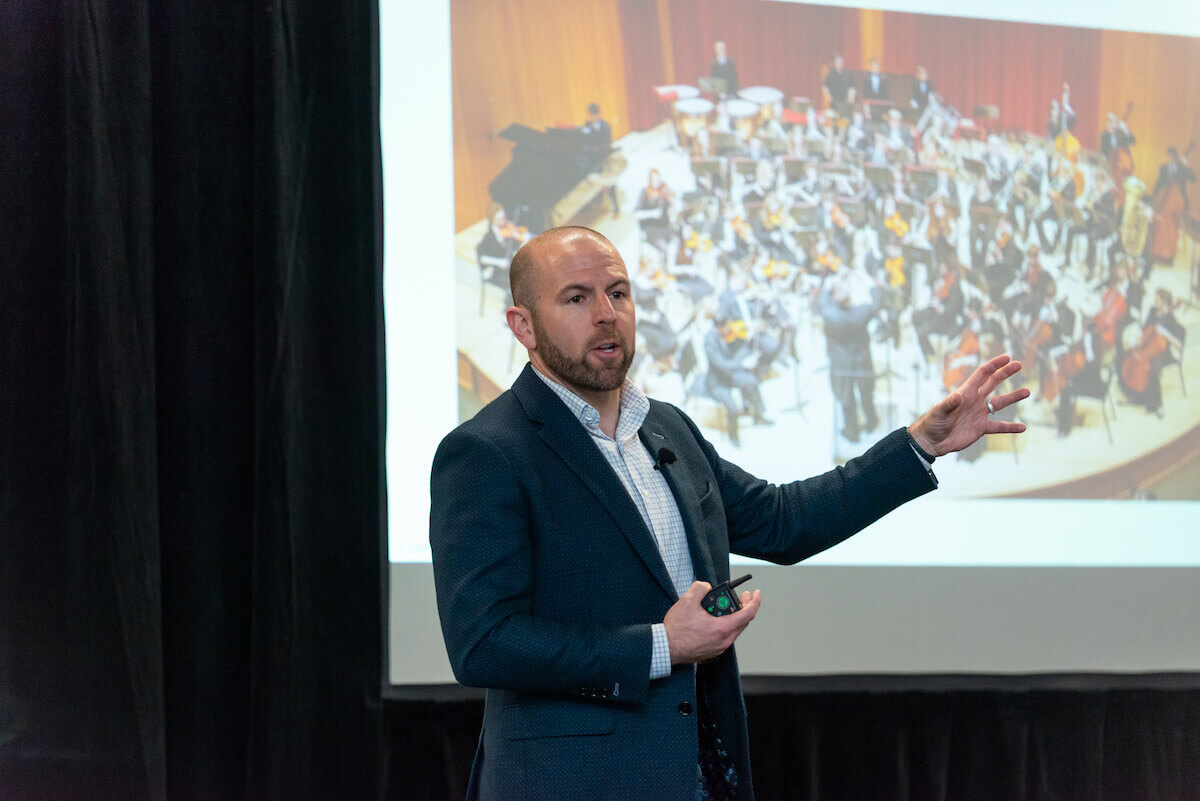Eight Principles Product Managers Should Adopt From Orchestra Conductors
What can product managers learn from orchestra conductors? A lot, apparently. Jeff Lash of SiriusDecisions offered this alternative metaphor to CPOs being the CEO of the product at ProductCraft: The Conference.
Lash knows a thing or two about the music biz. While he has never been a conductor, he grew up playing drums and percussion and is a vibraphonist (similar to a xylophone—think every grade school’s example of the letter “X”), complete with a successful jazz trio (he has some recordings on his personal website).
Lash says that the “CEO of the product” metaphor can be problematic because product managers either a) take it too far heart and act like tyrants, or b) throw their hands up in frustration because they don’t have the same “power” that a CEO has (like the ability to control budget and resources in other functions, for example). Instead, strive to be more like a conductor by embracing these eight principles.
Cue the music.
-
Alignment
The orchestra is made up of a wide variety of instruments that fall into four families: strings, brass, percussion, and woodwinds. Each of those instruments is responsible for providing its unique sound. It is the conductor’s job to make sure that each instrument plays its specific part harmoniously with the rest of the ensemble. It’s the product manager’s job to make sure that the product team aligns well with different departments to fuel growth and increase profitability. Without alignment, or in the orchestra’s case, harmony, the product will fall flat.
-
Expertise
Conductors need to know a lot about a lot of different things. Same goes for product managers. Unlike other departments that stratify into niche roles (see: marketing), product managers have one sole responsibility: product management. Product managers should be generalists, but they also need to know enough about each of the areas surrounding their main role to do their job effectively.
-
Differentiation
How can someone take something that’s been heard or seen a million times and make it feel new? Differentiation. But stay wary, product managers. Don’t differentiate your product on things people don’t care about. Identify the value that your product brings and enhance that. Take something that’s been done before and delight users in a unique way.

-
Direction
Don’t ask your customer what features they want, but rather what they’re trying to achieve. It is your job as a product leader to uncover this and convey that desire to your team.
Lash used this quote from the conductor Troy Peters to illustrate this point: “I always try to focus on describing the sound that I want — the sound that the composer needs — but trusting the musicians to figure out how to make that sound.”
Give your team the desired outcome and trust that they know how to get there.
-
Leadership
Once musicians make it into an established orchestra, they usually stick around for a while (if not forever). Their veteran statuses give the group of musicians the power to reject the conductor like a bad lung. The conductor must prove themselves as a leader as product managers must do in their organization. PMs can’t fire people, but they can lead with influence. They carry the responsibility of establishing a vision for the rest of the company.
-
Value
“Have you ever watched a conductor and thought, ‘I can do that?’” asks Lash. Personally, I’ve always thought that it looks like they’re just waving a stick around like Harry Potter in “The Order of the Phoenix.” How much are the musicians actually relying on them to set the tempo? According to studies, however, conductors actually do make a statistical difference in sound quality.
Same goes for product managers. Some people may think that customer feedback should be handed directly to engineering so they can start building. If you’re a PM, you know how bitterly wrong this is. Lash says that it could be helpful for product managers to explicitly provide their value proposition to their organization.
-
Balance
Product managers and orchestra conductors have a lot of stakeholders that they have to manage (and appease). Conductors have their musicians, the audience, the composer, and the big bucks, donors, to make happy. Product managers also need to balance the different needs of those around them—customers, prospects, other departments, the c-suite, and investors. They have to build with all those people in mind and miraculously hand over a product that suits all of their needs.
-
Guidance
In product management, the whole is more than the sum of its parts. Lash says that a good conductor can take a bad orchestra and make them said sound good, just like a bad conductor can make a good orchestra sound bad. A good product leader can do the same. Lead with integrity and influence, and soon enough, you’ll be making magic.


